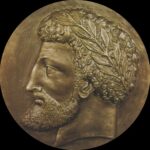Masinissa was the first king of Numidia (present-day eastern Algeria and western Tunisia) in 202-148 BCE and an important ally of the Romans1 in the second Punic war against Carthage. It was in the battle of Zama in 202 BCE that the Numidian cavalry largely determined the defeat of Hannibal.
Masinissa had as a wife, among others a certain Sofonisba – the daughter of Hasdrubal, a Carthaginian leader. The wedding took place after the victorious battle of Utica in 204 BCE. Scipio Africanus found the relationship dangerous because Sofonisba was the daughter of a fierce enemy of Rome and forced her ally2 to send a cup to her newly married wife from poison. Sofonisba drank it without objection.
Interestingly, according to reports, Masinissa was to live over 90 years (he was born around 238 and died 148 BCE). According to Appian from Alexandria, Masinissa enjoyed physical fitness until the end of his life, rode a horse, commanded in battles and at the age of 86 his last descendant was born – named Methimannus. His jurisdiction became proverbial and apparently he never had less than ten descendants.
After Masinissa’s death, Numidia was divided into several smaller kingdoms in which his sons ruled.
Finally, it is worth mentioning the parable of Valerius Maximus in De factis dictisque memorabilibus. He recalls how one day Greek merchants came to the kingdom of Masinissa with the intention of buying monkeys. When Masinissa found out about it, he was supposed to say: Oh people! Do not your women give birth to children?







